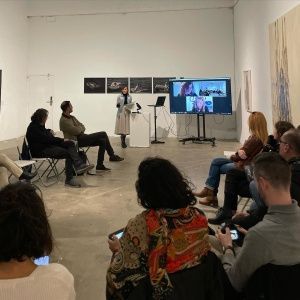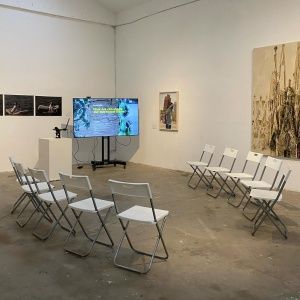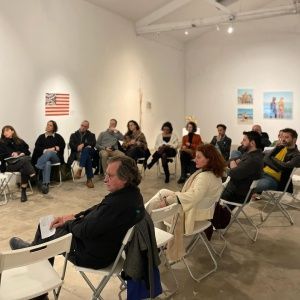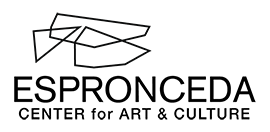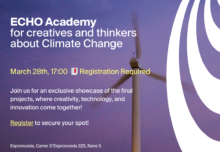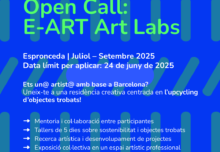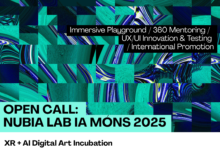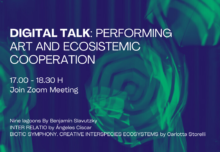Com l’art pot donar forma al nostre futur ecosocial
DATA: 29/02/2024
H: 18.30
LLOC: Espronceda, Institut d’Art i Cultura
Moderadores: Savina Tarsitano i Alessia Gervasone
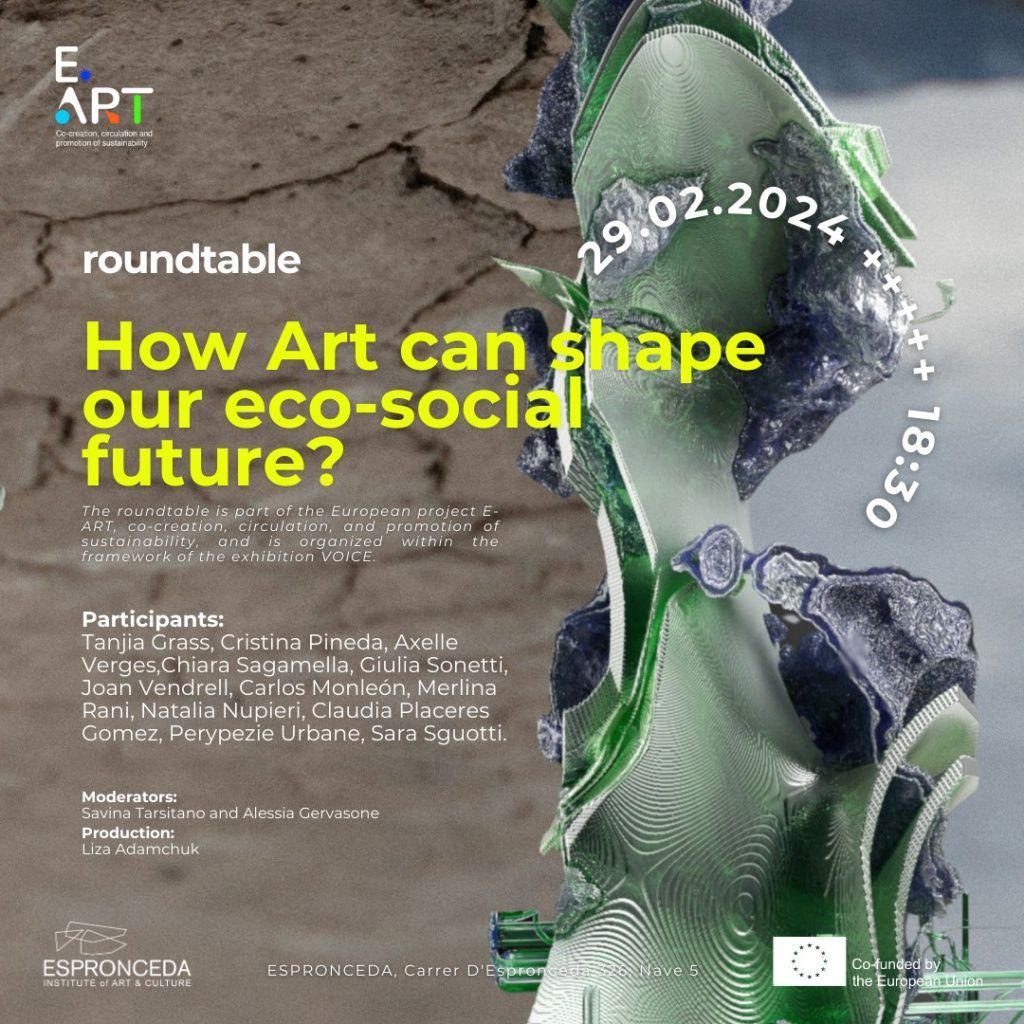
La taula rodona forma part del projecte europeu E-ART, co-creació, circulació i promoció de la sostenibilitat, i s’organitza en el marc de l’actual exposició “Veus”- II Edició de la Diplomàcia Cultural actualment exposada en Espronceda i comissariada per Savina
Tarsitano en col·laboració amb Victoria Tissot i Mohamed Benhadj (en associació amb el Consolat Alemany de Barcelona) que, reunint artistes nacionals i internacionals, reflexiona i crida l’atenció sobre dos temes importants en el context contemporani, com són la llibertat d’expressió i el paper dels refugiats en la societat.
El projecte E-ART té com a objectiu promoure la sostenibilitat en l’àmbit de l’art. Posa l’accent en la importància de la sostenibilitat i la protecció del clima, tractant d’aconseguir un impacte significatiu mitjançant la introducció de pràctiques artístiques i metodologies de recerca que puguin considerar-se sostenibles i ecosocials. Al mateix temps, tracta d’entendre com les pràctiques estètiques i artístic-activistes més estretament definides contribueixen a conscienciar-nos sobre els processos de transformació mediambiental que s’estan produint singularment. El projecte es caracteritza per diverses fases i pretén sensibilitzar mitjançant la creació de tallers, conferències, un quadern de pràctiques sostenibles, residències artístiques en línia i artlabs orientats a la creació d’obres d’art sostenibles per a exposicions locals. Aquesta iniciativa també pretén sensibilitzar i fomentar una comunitat de professionals disposats a adoptar aquestes pràctiques i promoure-les.
RESUM DE LA TAULA RODONA
Les pràctiques artístiques i curatoriales es caracteritzen per la identificació, selecció i interpretació d’elements materials i immaterials amb la finalitat de generar noves percepcions i imaginaris en els ciutadans i renovar el pensament crític col·lectiu. Les pràctiques artístiques operen, de fet, en un pla simbòlic però també en un pla real, ja que són capaços d’influir directament o indirectament en l’estat emocional del perceptor implicat en l’experiència artística.
Així doncs, la recerca artística ha d’afrontar el complex repte d’aplicar a la conservació del medi ambient nous paràmetres estètics i ètics amb un enfocament anticolonial i multiespecífic.
Partint del treball d’Espronceda en el camp de la sostenibilitat i l’educació, aquesta taula rodona tractarà d’explorar com l’art i el comissariat poden promoure una consciència col·lectiva tant ètica com ecològica entre els ciutadans, abordant els actuals reptes socials i mediambientals amb creativitat i innovació.
socials i mediambientals amb creativitat i innovació.
També es pretén reflexionar sobre com artistes i comissaris poden adoptar enfocaments i metodologies que es considerin sostenibles tant des del punt de vista social com mediambiental.
La taula rodona, en un diàleg obert entre els participants i el públic, presentarà i debatrà qüestions, metodologies i competències necessàries relacionades amb aquest aspecte de la llibertat artística, tant des de la perspectiva de l’expressió com de la producció. L’aspiració és
a intentar delinear nous imaginaris de futur menys competitius, no colonials i basats en la valorització de pràctiques que puguin configurar formes de comunitat capaces d’incloure els drets humans i no humans en el procés de presa de decisions i que puguin
adoptar principis relacionats amb la sostenibilitat mediambiental, la resiliència i l’ús equitatiu dels recursos naturals.
Els artistes i comissaris poden anar sovint més enllà de la pura estètica i desafiar les narratives dominants qüestionant pràctiques a vegades insostenibles, estimulant noves connexions i fomentant col·laboracions (amb científics, activistes, responsables polítics i la societat civil) que puguin contribuir a un futur més equitatiu i sostenible en aquest context contemporani d’injustícies geopolítiques.
geopolítiques.
La recerca artística pot ser un motor de conscienciació i canvi, ajudant-nos a imaginar un futur que ens permeti superar l’antropocentrisme i salvaguardar els ecosistemes amb els quals convivim.
MODERADORS:
Savina Tarsitano i Alessia Gervasone
Producció:
Lliça Adamchuk
Milo d’Atapeït
Comunicació:
Renata Procopio
PARTICIPANTS:
Tanjia Grass, directora del Festival Internacional d’Art Sostenible de Catalunya:
https://drap-art.org/es/
(En presència)
Cristina Pineda, directora de “El Llumí”, productora audiovisual amb seu a Barcelona, crea peces sobre temes relacionats amb la sostenibilitat, la naturalesa i la igualtat de gènere, entre altres: https://lacerilla.com/
(En presència)
Axelle Verges, fundadora de Positive Lab, una matriu ecofeminista que connecta l’art, les ciències i el coneixement cultural per a generar iniciatives “ecosistèmiques i femenines” amb un fort impacte social, mediambiental i econòmic: https://www.positivelab.eu/
(Participació en línia)
Chiara Sagamella, artista i professora de la Universitat Politècnica de València. En el seu treball, que inclou recerca teòrica, pràctica artística i pedagogia, explora críticament la complexa relació entre les societats humanes i els ecosistemes naturals.
https://chiarasgaramella.com/
(Participació en línia)
Giulia Sonetti, professora de Recerca Transdisciplinar en Sostenibilitat en el CENSI – Centre de Recerca en medi ambient i Sostenibilitat i Politècnica de Catalunya i amant de l’art:
https://www.linkedin.com/in/gsonetti/?originalsubdomain=es
(En presència)
Joan Vendrell, director científic del CACiS _ Centri d’art contemporani i de sostenibilitat de Calders, Catalunya: https://cacis.elforndelacalc.cat/
(En presència)
Carlos Monleón, artista conceptual que treballa entre diferents nivells de sensació i percepció corporal, des del (micro)biològic al performatiu i social.
https://carlosmonleon.com/
(Participació en línia)
Merlina Raní, comissària d’art especialitzada en mitjans digitals i divulgació científica. La seva recerca gira entorn dels entorns virtuals i la seva connexió amb el físic:
https://merlinarani.xyz/
(En presència)
Natalia Nupieri, dissenyadora de moda sostenible i gestora de projectes en Tecnocampus
Mataró_Càtedra de l’Economia Circular i de la Sostenibilitat:
https://www.linkedin.com/in/natinupieri/
(En presència)
Clàudia Plaers Gomez, investigadora i galerista en Galeria Esther Montoriol:
https://montoriol.com/es/
(En presència)
Perypezie Urbane, organització cultural compromesa que treballa per a fomentar la recerca sobre les arts i les cultures [digitals]: https://www.facebook.com/perypezye/
(En presència)
Sara Sguotti és una ballarina, performer i coreògrafa italiana interessada en els cossos singulars, plurals i col·lectius. Li encanten totes les formes de la microcol·lectivitat i l’embull de pensaments.
(En presència)
